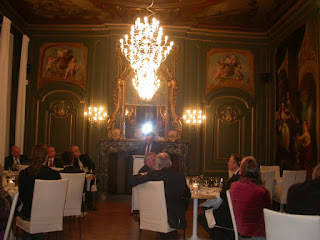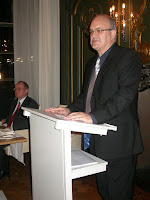On Thursday 2 December 2010, we had the annual NIJMEGEN PRESTIGE LECTURE IN BIBLICAL STUDIES here in Nijmegen. It was truly a momentous occasion given the significant papers professor Michael Wolter from the university of Bonn delivered. Turnout at the afternoon public lecture was good, and for the special evening dinner, we had guests coming from Amsterdam, Utrecht, Germany, Hungary and Stellenbosch, South Africa.
Which Jesus is the Real Jesus?
The paper professor Wolter delivered at the evening dinner, Which Jesus is the Real Jesus? was highly significant (and maybe controversial?) and promises to create a stir in academic circles. This paper will form the basis of an exciting new Brill publication. Not giving away anything, I can at least say that he engages critically with the likes of Dale Allison (particularly his new book, The Historical Christ and the Theological Jesus [Grand Rapids , MI
Paul, the Radical Apostle - his life and thoughts that changed the World
In what follows I offer a brief summary of some of the main points that stood out for me in professor Wolter's afternoon public lecture. These are my own, provisional interpretations. The title of the paper, as indicated above was: Paul, the Radical Apostle - his life and thoughts that changed the World.
The pre-Christian Pharisaic Paul saw himself as part of a community through which an exclusive ethos that is standardised by the Torah, determined the identity of Israel. At this stage, Paul's commitment to the fulfilment of the Torah was therefore primarily a commitment to Israel and the preservation of her holiness as God's people (Phil. 3; Gal. 1; Acts 22).
- Paul did not persecute 'Christians', but Jews who differed essentially from other Jews only in that they revered Jesus of Nazareth as the Messiah. Paul places himself in the tradition of zeal which demonstrates that his activity as a persecutor was motivated by the fear for a possible loss of Israel’s holiness. For Paul, the Torah cannot be fulfilled apart from the holiness of God.
- Paul's persecution was triggered by two things: 1) The claim that a crucified criminal, and thus one accursed by God, is the Messiah; 2) The Jesus-Jews had put the importance of temple and the Law into question. For such an interpretation, which places Christology at the centre, Paul’s radical re-orientation must have been quite obviously caused by a Christological insight.
- How did Paul interpret this event? The real theological substance of Paul's conversion was: a new reality had opened up for Paul the Pharisee, which was no longer centrally organised around Israel's election or the opposition of Israel and the nations, but around Jesus Christ, raised by God from the dead and appointed son and Kyrios, who was thus given a universal claim to lordship.
- The Damascus 'vision' had thus lead Paul to the conclusion that the way to participation in God’s holiness had been opened up to the nations through Jesus Christ. They no longer had to become Jewish. (It might be interesting to compare this insight with the likes of Dunn and Wright).
- Professor Wolter then went on to describe two important phases in Paul's life journey: Paul the missionary, en Paul the letter writer (these two phases in Paul's journey seem obvious in hindsight but frankly, I've never really thought it through systematically..)
Matin Luther
Probably the most significant part of the paper for me, was professor Wolter's reflection on Martin Luther in the last quarter of the paper:
"Between him [Luther] and Paul, there are two main differences:
First, in Luther, the question of the Law is no longer embedded in the Israel question. By ‘Law’ Luther no longer meant only the Torah, through which Israel expresses its election from the nations, but for him the ‘law’ is anything that confronts people as an ethical demand: “The law preaches what is to be done and what is to be left alone” (WA II, 466:3-5), and “good works are to be done and practised in obedience to the law” (WA LII, 349, 19-20). We do not have to look long to find the reason for this change: Unlike Paul, Luther no longer had to handle the process of Christian-Jewish separation. This in Luther’s days had already been completed more than 1000 years ago.
The second aspect is connected to the fact that Christianity at the time of Luther was no longer a religion of conversion, but had changed into a religion of tradition. ‘The believers’ were not in the minority any more. The culture of Luther’s environment had become entirely 'Christian'.
On the other hand, there was, of course, still the dividing line between salvation and condemnation. Due to the changing cultural conditions, however, it no longer ran, as it did for Paul, between the minority of believers and the majority of unbelievers. Rather, the line coursed through the middle of each individual. It was this border experience, which the Augustinian monk Luther suffered in his own moral dilemma and was from it through the discovery of Paul’s doctrine of justification. Thus also Luther went through a conversion, but it differs fundamentally from Paul’s. Their consequences are also different: Luther's reformulation of the doctrine of justification was not based on ecclesiology, as it had been with Paul, but contained, in extension to his own experience, an orientation towards the individual Christian. Anthropology could then no longer be the solution. It became, rather, the problem. In this way, Luther gave the semantic field of the doctrine of justification a different topography. What was for Paul a more peripheral issue, now came to the fore: that it is the sinner whom God justifies sola fide and sola gratia. Conversely, the ecclesiological issues were pushed aside.
It would be unfair to accuse Luther of theologically distorting the Pauline doctrine of justification. His interpretation, however, had the consequence that the central ecclesiological impetus of Paul’s doctrine of justification has up to this present day become largely invisible and has been widely ignored by the Christian churches to their own detriment. It has become evident that the original Pauline concept bears an ecumenical openness, which extends beyond its original context of discovery. This sense of openness is, quite simply, that faith in Christ, which manifests the Christian identity of all churches, not only suspends the difference between Jews and Gentiles, but also makes the historically developed cultural characteristics and differences by which the churches differentiate from each other and without which Christianity has never existed, entirely irrelevant."














4 comments:
I will try to write my opinion about this topic using a simile (this simile is not perfect, however, it is useful for me to formulate my thoughts).
I think what we see in the gospels of Jesus can be compared to a painting that tries to portray reality. The painter paints that piece of reality, e.g. landscape, in a way which makes people understand and feel what he wanted to represent. If the painter reconstructs the reality exactly as it is, it won’t have any effect, because people only see a duplicate, that is not the reality itself, neither it is an image that gives a true picture of the reality because it’s empty; therefore, it doesn’t touch people. Therefore, to make an effective and meaningful painting, some details of the original picture have to be wiped out and other details have to be enhanced. Nevertheless, we know that there is a real landscape that was used not only as an inspiration for the painting, but it is also the reality that is present in its representation.
reka
Thanx for keeping us up to date. The next best thing to actually being at these lectures, is reading your summaries. And thanx for the pictures. Blessings!
You are privileged to attend these very significent conferences. In this way you meet some of the most profound lecturers in this specific field.In appreciate your summary of the last conference.The photos tell the story. Please indicate who these people are. Thank you for keeping us updated!
Great job on the summary. His presentation didn't sound novel, when compared to the New Perspective people, but your outline was a great "snapshot" of the historical/theological view of Paul and his views. I have (most of) your same passions (as listed in your profile). I accidentally found this blog. Keep up the good work! (My PhD is via Baylor University in Texas, USA) I'm jealous you got to work with Wright and others! Blessings, David
http://www.thedisciplechurch.org/blog/
Post a Comment